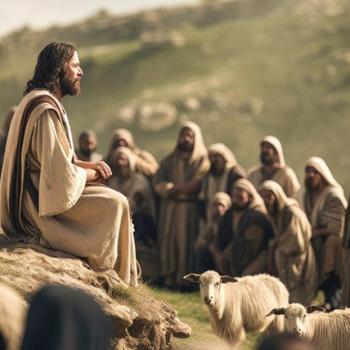The previous post showed that we cannot define the “nations” (ethne) in the Bible by using sociologically-defined “people groups.” The word “nations” normally refer to Gentiles (i.e. non-Jews); the phrase “all nations” typically alludes to Jews-and-Gentiles. Accordingly, “nations” is a vaguer term compared to “people groups,” at least as used by contemporary missionaries.

Whereas the last post distinguished “nations” and “people groups,” this post questions the conventional logic underlying the mobilization of missionaries to UPGs (unreached people groups).
Basing Strategy on Ambiguous Texts
What about Matthew 24:14? Jesus says,
“And this gospel of the kingdom will be proclaimed throughout the whole world as a testimony to all nations, and then the end will come.”
What does this verse indicate? That Jesus will return once every ethnolinguistic people group hears the gospel? The verse only speaks of proclamation, not acceptance.
Also, if we equate “all nations” with “people groups” (as is commonly done), we have to ask, “How many people groups are there?” Missiologists cannot agree. The Joshua Project says the answer depends on how we count “people groups.” Therefore, estimates range from 9,800-24,000 groups. That is a huge range.
For mission agencies that base their strategies on Matthew 24:14, hoping to hasten Christ’s return, this ambiguity presents a problem. After all, who do we try to reach? How many groups do we need to engage in order to usher in Christ’s return?
How might we need to rethink the role of Matthew 24:14 in our mission thinking?
Which Task Should We Finish?

In a recent article, Matthew Bennett offers a “cautionary analysis of missionary language.” In a word, he laments the tendency of people to confuse the promise of Matthew 24:14 with the command of Matthew 28:19 (“make disciples…”).
Consequently, we sometimes truncate the church’s mission. The following nicely captures Bennett’s concern.
Despite this appropriate enthusiasm for the idea that the ends of the earth could soon hear the gospel, there remains a troubling conflation of promise and command in some of the literature. This conflation can lead to an overemphasis on rapidly reaching the unreached with the gospel, often at the expense of full obedience to the command to make disciples and to teach them to obey all that Christ commands.
The missionary task becomes reaching, with robust teaching being jettisoned as of secondary priority. In part, this may be due to missions strategies that root themselves in Matt 24:14, seeing in it a command to evangelize all the earth’s peoples.” (p. 37)
By “evangelize,” he refers to the task whereby Christians proclaim the message of salvation. In common parlance, evangelism is the task by which people get saved or “become Christians.” However, he says, “world evangelization is but a partial aspect of the missions task given in the Great Commission” (p. 38).
In other words, people use Matthew 24:14 to justify their making mere “converts,” not disciples.
The Meaning of Matthew 24:14
Common interpretations of Matt 24:14 are strained at best.
Evangelicals routinely use this verse as motivation for people to hasten Christ’s return. Stated baldly, the message says, “If we make sure all those UPGs have a Christian population of about 5%, then we consider them ‘reached’ and can reasonably expect Christ to return soon thereafter.”
Bennett, on the other hand, cautions against this cause-effect reading. He summarizes the essence of Matthew’s message.
God is not willing that the end might come prior to the gospel of the kingdom being proclaimed throughout the whole world and to its people. In the midst of the dark picture of the future that Jesus paints surrounding this passage, there is yet this ray of hope demonstrating that he is sovereign. (p. 39)
In other words, Jesus gives a word of encouragement. It is a promise that his kingdom will be proclaimed among all the nations despite the conflicts that surround his people. Bennett elaborates,
Jesus is not telling the disciples about a sequence of events that will cause a chain reaction. Much less can he be seen to be instructing them as to how to affect his return.
Instead Jesus’ intent is to reveal that the “end of the ages” is to be a time that will be marked both by tribulation and by universal mission: “This does not mean that all the nations will be converted before the end can come but rather that the universal proclamation will continue until the end.” (p. 41)
Bennett points out that “the word κηρυχθήσεται is a future passive verb meaning “will be proclaimed.” As a passive verb, this indicates a condition which will attain while not focusing on the causal agent” (p. 39).
Furthermore, the precise connotation of Matt 24:14 is unclear. For instance,
“The construction of the phrase “as a testimony to all nations” (εἰς μαρτύριον πᾶσιν τοῖς ἔθνεσιν) contains a dative preposition (εἰς) which can be rendered “to” or “against.” While there is likely a dual sense to this idea of witnessing to and against the nations, it must be noted that Jesus’ promise does not here give any indication as to how the nations will receive the proclamation.
This proclamation to the whole inhabited world may be effective in winning the nations over, yet it could be seen to justify the condemnation of the guilty.” (p. 41)
Arguably, in Paul’s mind, the gospel had been preached to “all nations” (cf. Rom 10:18; Col 1:23) by the end of Paul’s ministry. Again, that claim depends on what Paul means when he says “all nations” (cf. Acts 19:10; see my previous post).
Promises are Not Commands
What’s the bottom line? Christ calls the church to “make disciples of all nations,” which entails both initial conversion (v. 19) and maturity as seen in obedience (v. 20). This is the church’s mission.
By contrast, Matt 24:14 is a promise, not a command merely to evangelize or make converts as a way of hastening Christ’s return. This is a common way of reading v. 14, but it ignores Matt 28:19-20. Specifically, it focuses only on the first part of the Great Commission.
This misreading of Matthew has consequences for mission strategy. The stress on speed undermines the call of the gospel and Christ’s explicit command. I can’t improve upon Bennett’s closing remarks. He says,
However, to the degree that world evangelization as a task draws the church’s attention away from the robust disciple-making process of the Great Commission, let the church reconfigure her methodologies to reflect the command with which she has been entrusted rather than the promises which are God’s to ensure. Likewise, if missions mottos serve to give the impression that the task of missions is less than making life-long disciple-makers, the mottos too must be discarded.
As has been shown, if Matt 24:14 is taken as the basis for missions strategy, one runs the risk of screening out the emphasis Jesus puts on discipleship, church planting, and teaching.
While world evangelism should certainly be part of the goal of missions strategies, the whole command of Matt 28:18–20 given to the church must be taken into account in assessment of appropriate tools, strategies, and methodologies. (pp. 47-48)
In the next post, I’ll offer a few thoughts and suggestions about how our observations about “all nations” might affect mission strategy.












